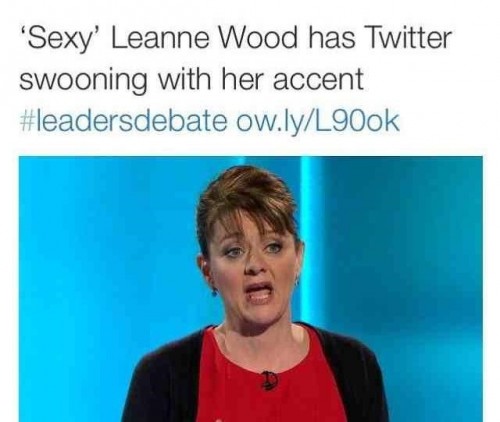Engender blog
All of Engender’s latest news. Reports, reviews, books, articles, and information from across Scotland’s women’s sector.
We would love to hear from other feminists around Scotland. Check out our guidelines for more information on how you can blog for us.
Guest Post: A politics by and for women
Guest post by Sarah Beattie-Smith, Westminster Candidate for the Scottish Green Party in Edinburgh North and Leith
If this general election campaign will be remembered for one thing, it’s the role played by women and by Scotland in a political culture that was utterly unprepared to share the stage with either. Whether it’s a London based media waking up to the fact that Nicola Sturgeon exists (and that she happens to lead a country) or whether it’s a generation of voters seeing Green Party of England and Wales leader Natalie Bennett, Plaid Cymru leader Leanne Wood and Nicola Sturgeon breathing life into this election and challenging the austerity consensus, it’s clear that politics has changed. As Lesley Riddoch, put it recently, what we’re seeing is “the end of the Big Man and the start of the assertive woman as the preferred model for political authority”.
Scottish Women’s Rights Centre launched
The Scottish Women’s Rights Centre was launched on 22nd April at the University of Strathclyde. The event was a great success and resulted in many agencies contacting regarding the new service.
The SWRC offers free legal information and advice to women survivors of gender based violence. It is a partnership project between Rape Crisis Scotland, the Legal Services Agency and The University of Strathclyde Law Clinic. The project is funded until September 2016 by the Scottish Government through the Scottish legal Aid Board and by Foundation Scotland until 2017. The project is overseen by a specialist Advisory Group and is co-ordinated, on a part time basis, by Katy Mathieson of RCS Helpline.
Guest Post: “Leanne Wood, I would!” (Helpful Twitter Guy, 2015)
Guest post by Harriet Protheroe-Davis, student activist and Women 50:50 Edinburgh branch organiser
Just when you think things are about to change the old creeping hand of tradition and misogyny comes and awakens you to the realities of women just not being good enough.

Guest Post: Sexism is societal problem that every party must tackle
Guest blog by Kezia Dugdale, MSP and deputy leader of the Scottish Labour Party
The months leading up to the General Election have been a reminder of just how blatant sexism is across society. Whether it’s the sexist tweets I get sent about my appearance after every TV interview or reading through a newspaper in the morning and taking a mental note of how many times a male journalist or editor is in the top line, the harsh reality for women in Scotland cannot be missed.
Whether it is in a discussion, whether it is in the media or if it is within my own party, I have and will continue to, stand up to the sexism women face day in and day out.
What are your plans for women and children?

This General Election, ask your candidates what their plans are for women and children.
We know that women, children and young people have been disproportionately impacted on by recent changes to public spending. What happens at Westminster hugely affects us all. We'd like your support in asking candidates how they will protect and support women and children from discrimination, poverty and harm.
Downloads
 Engender Briefing: Pension Credit Entitlement Changes
From 15 May 2019, new changes will be introduced which will require couples where one partner has reached state pension age and one has not (‘mixed age couples’) to claim universal credit (UC) instead of Pension Credit.
Engender Briefing: Pension Credit Entitlement Changes
From 15 May 2019, new changes will be introduced which will require couples where one partner has reached state pension age and one has not (‘mixed age couples’) to claim universal credit (UC) instead of Pension Credit.
 Engender Parliamentary Briefing: Condemnation of Misogyny, Racism, Harassment and Sexism
Engender welcomes this Scottish Parliament Debate on Condemnation of Misogyny, Racism, Harassment and Sexism and the opportunity to raise awareness of the ways in which women in Scotland’s inequality contributes to gender-based violence.
Engender Parliamentary Briefing: Condemnation of Misogyny, Racism, Harassment and Sexism
Engender welcomes this Scottish Parliament Debate on Condemnation of Misogyny, Racism, Harassment and Sexism and the opportunity to raise awareness of the ways in which women in Scotland’s inequality contributes to gender-based violence.
 Gender Matters in Social Security: Individual Payments of Universal Credit
A paper calling on the Scottish Government to automatically split payments of Universal Credit between couples, once this power is devolved to the Scottish Parliament.
Gender Matters in Social Security: Individual Payments of Universal Credit
A paper calling on the Scottish Government to automatically split payments of Universal Credit between couples, once this power is devolved to the Scottish Parliament.
 Gender Matters Manifesto: Twenty for 2016
This manifesto sets out measures that, with political will, can be taken over the next parliamentary term in pursuit of these goals.
Gender Matters Manifesto: Twenty for 2016
This manifesto sets out measures that, with political will, can be taken over the next parliamentary term in pursuit of these goals.
 Scottish NGO Briefing for UN Special Rapporteur on Violence Against Women
Joint briefing paper for the UN Rapporteur on Violence Against Women.
Scottish NGO Briefing for UN Special Rapporteur on Violence Against Women
Joint briefing paper for the UN Rapporteur on Violence Against Women.

Newsletter
Sign up to receive our newsletter here:
Sign up to our mailing list
Receive key feminist updates direct to your inbox: